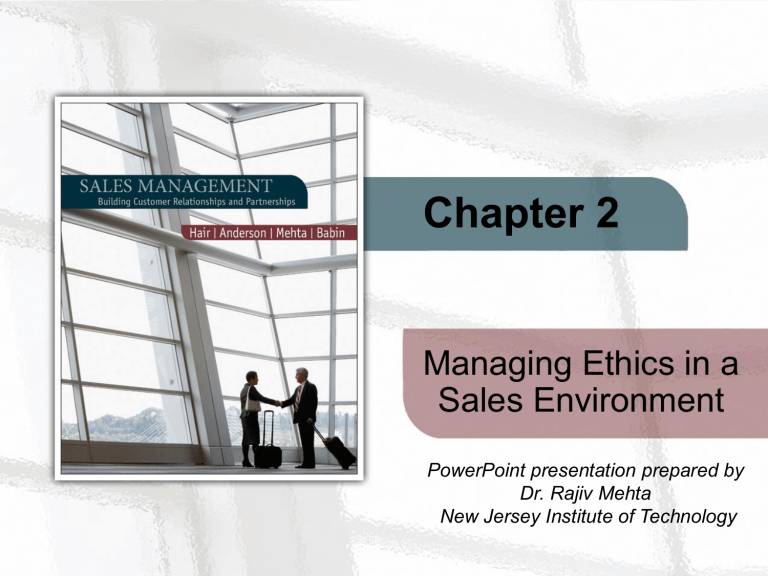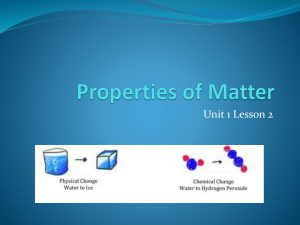Chapter 2

Chapter 2
Managing Ethics in a
Sales Environment
PowerPoint presentation prepared by
Dr. Rajiv Mehta
New Jersey Institute of Technology
Chapter Outline
• What Is Business Ethics?
• Salespeople Are Boundary Spanners
• Applying Professional Sales Codes of Ethics
• Ethical Philosophies and Moral Judgments
• Creating an Ethical Work Climate
• Managing the Ethical Climate
• Legal Considerations in the Sales Environment
• Practicing Good Ethics Among the Sales Force
Copyright © Houghton Mifflin Harcourt Publishing Company. All rights reserved.
2 | 2
Learning Objectives
After reading this chapter, you should be able to do the following:
1. Define ethics and defend its importance to sales and sales management.
2. Show how salespeople are boundary spanners.
3. Apply a code of ethics to sales and sales management situations.
4. Apply the criteria for making moral judgments.
5. Create and manage an ethical climate.
6. Observe legal regulations that affect the sales environment.
7. Model good ethical behavior among the sales force.
Copyright © Houghton Mifflin Harcourt Publishing Company. All rights reserved.
2 | 3
Business Ethics, Sales, and Sales Management
• Ethics describes the moral content of behavior.
• Business ethics is the study of how businesspeople behave when facing a situation with moral consequences.
• Sales management ethics is the specific component of business ethics that deals with ethically managing the sales function.
Source: S. Pearce/PhotoLink
Copyright © Houghton Mifflin Harcourt Publishing Company. All rights reserved.
2 | 4
Balancing Between Individual,
Professional, and Organizational Values
Individual ethics
• personal integrity
• moral values
• social influences
Organizational ethics
• profit
• growth
• survival
Pressures
Professional ethics
• professional standards
• group goals
• prestige
Copyright © Houghton Mifflin Harcourt Publishing Company. All rights reserved.
2 | 5
Customer Vulnerability
1.
Vulnerability
Consumer-directed approaches
2.
Ignorance l ack of some vital knowledge, often product knowledge, needed to participate in a fair exchange
3.
Powerlessness l ack of either competition within a marketplace or sufficient assets with which to be persuasive
Copyright © Houghton Mifflin Harcourt Publishing Company. All rights reserved.
lack of experience or the ability to conduct a transaction or negotiate terms of a fair deal
2 | 6
Types of Codes of Ethics
suggested by government agencies or other special interest groups
4.
Advisory group codes ethical boundaries for employees
3.
Business association codes
Types of codes of ethics ethical boundaries for people engaged in the same line of business; e.g., Direct Selling
Association of America
2.
Professional codes
Copyright © Houghton Mifflin Harcourt Publishing Company. All rights reserved.
1.
Company codes ethical boundaries for occupational groups such advertisers, sales representatives, doctors, lawyers, and accountants
2 | 7
Moral Philosophy
Moral philosophy deals with the systematic ways that individuals recognize and resolve decisions having moral content.
1.
Bases of moral philosophy
2.
Idealism Relativism
Ideals are a set of principles by which individuals determine morality.
3.
Teleology
A moral absolute represents a rule that should always be applied with no exceptions or excuses.
Teleology defines morality based on the
consequences of the behavior that allows some indiscretion based on the argument that the “good” that results is more important than the harm caused.
Copyright © Houghton Mifflin Harcourt Publishing Company. All rights reserved.
Relativism is a process by which individuals reach moral decisions based more on the actions they perceive to be acceptable given a
particular situation.
2 | 8
Moral Judgments
A moral judgment is a person’s evaluation of the situation from an ethical perspective.
1.
Moral equity
Bases of moral judgments
2.
Acceptability the inherent fairness or justice in a situation
3.
Contractualism the extent to which an act is consistent with stated or implied contracts and or laws
Copyright © Houghton Mifflin Harcourt Publishing Company. All rights reserved.
h ow culturally or socially acceptable we perceive an action to be
2 | 9
Unethical Sales Practices:
Prohibited Actions
• bribes, gifts, kickbacks
• conflicts of interest
• illegal political payments
• violation of laws in general
• use of insider information
• violations of secrecy agreements
• falsification of sales accounts
• moonlighting
• violation of antitrust laws
• fraud and deception
• illegal payments abroad
• justifying the means by the intended end
Copyright © Houghton Mifflin Harcourt Publishing Company. All rights reserved.
2 | 10
Ethical Concerns in
Selling and Sales Management
5.
Customer relationships
4.
Treatment of coworkers
1.
Employer ethics with their salespeople
Ethical concerns
2.
Salespeople’s ethics
& their company
3.
Treatment of competitors
Copyright © Houghton Mifflin Harcourt Publishing Company. All rights reserved.
2 | 11
Employer Ethics with Their Salespeople
• Compensation
– prompt, accurate payment of salary, commissions, and bonuses as well as timely reimbursement of selling expenses
• Sales territories
– fair assignment of sales territories
• Sales quotas
– setting realistic achievable sales quotas
• Hiring, promoting, and firing
– sexism, racism, and ageism must not influence managerial decisions
Source: Digital Vision
Copyright © Houghton Mifflin Harcourt Publishing Company. All rights reserved.
2 | 12
Ethical Violations
• misusing company assets
• expense account padding
• unauthorized use of company funds
• personal use of company time
• fabrication of sales records
• manipulation of customer orders
• cheating in sales contests
• circumventing company policy
Source: Digital Vision
Copyright © Houghton Mifflin Harcourt Publishing Company. All rights reserved.
2 | 13
Ethical Violations Against
Coworkers and Competitors
Treatment of coworkers
a. sexual harassment b. stealing customers from colleagues c. undermining coworkers
Treatment of competitors
a. disparaging competitors and their products or services b. tampering with competitor's products c. competitive snooping
Source: Digital Vision
Copyright © Houghton Mifflin Harcourt Publishing Company. All rights reserved.
2 | 14
Ethical Issues
Regarding Treatment of Customers
Source: Digital Vision
• special gifts
• entertainment
• over-promising
• over-selling
• misrepresenting, covering up the facts, or distorting the truth
• manipulating order forms
• disclosing confidential information
• showing favoritism
• conflicts of interest
Copyright © Houghton Mifflin Harcourt Publishing Company. All rights reserved.
2 | 15
Ethical Issues: Marketing Mix
1. Product quality and service
• poor product quality
• unsafe products
• unreasonable return policies
• poor after-sales service
2. Pricing
• inflated list prices
• not honoring pricing incentives
• adding hidden costs
Copyright © Houghton Mifflin Harcourt Publishing Company. All rights reserved.
2 | 16
Ethical Issues: Marketing Mix
3. Distribution
• using resellers that are aggressive, dishonorable,
“fly-by-night” operators
• using “bait and switch” strategies
4. Promotion
• deceptive advertising
• misleading product warranties
• phony promotional contests
• dishonest fundraising activities
Copyright © Houghton Mifflin Harcourt Publishing Company. All rights reserved.
2 | 17
Creating an Ethical Work Climate
pressure employees feel to prioritize increased sales, profits, margins, or other financial returns over all other concerns
4.
Bottom-line sales emphasis standard business norms and regulations as defined by senior management
3.
Peer behavior
Types of codes of ethics
1.
Policies and rules the extent to which employees view coworkers as having high moral standards
2.
Trust and responsibility how far people are trusted to behave in a responsible way and are held personally responsible for their actions
Copyright © Houghton Mifflin Harcourt Publishing Company. All rights reserved.
2 | 18
Managing the Ethical Climate
• Sales managers should be sure of the following:
– that salespersons are aware of rules and policies
– that salespersons are rewarded and reprimanded with no favoritism or bias
– that an ethical climate is promoted at all levels of the sales organization
Copyright © Houghton Mifflin Harcourt Publishing Company. All rights reserved.
Source: Digital Vision
2 | 19
Legal Considerations in the
Sales Environment: Federal Regulation
Protecting Companies from Each Other
• Laws that ensure that a competitive marketplace exists include the following:
– Robinson-Patman Act
– Sherman Antitrust Act
– Clayton Act
Copyright © Houghton Mifflin Harcourt Publishing Company. All rights reserved.
Source: Hisham Ibrahim
2 | 20
Federal Regulation Protecting
Companies from Each Other
1.
Price discrimination
Laws protect firms against
2.
Collusion
Price discrimination consists of favoring different customers on price or terms of sale when the discrimination has a harmful effect on competition.
Price discrimination is allowed under two conditions:
(a) The price differential is given in good faith to meet a price offered by a competitor.
(b) The price differential is based upon cost savings stemming from quantities in which products are sold or delivered.
3.
Price fixing
Competitors who conspire to set or maintain uniform prices and profit margins are fixing prices.
Copyright © Houghton Mifflin Harcourt Publishing Company. All rights reserved.
Collusion occurs when competitors conspire to set prices, agree to divide territories on a noncompetitive basis, or join together to act to the detriment of another competitor.
2 | 21
Federal Regulation Protecting
Companies from Each Other
Tie-in sales occur when purchasers are forced to buy an unwanted item or items in return for being allowed to purchase a product in heavy demand.
4.
Tie-in sales
Exclusive dealing consists of agreements in which a manufacturer or wholesaler grants one dealer exclusive rights to sell a product in a certain trading area or insists that the dealer not carry competing lines.
7.
Reciprocity
Laws protect firms against
Reciprocity consists of selecting only suppliers who will also purchase from the buyer —“Buy from me and I’ll buy from you.”
6.
Restraint of trade
Copyright © Houghton Mifflin Harcourt Publishing Company. All rights reserved.
5.
Exclusive dealing
Competitors colluding to divide a market into noncompetitive territories or to restrict competition in a market are in restraint of trade.
2 | 22
Federal Regulation Protecting
Companies from Each Other
Unordered goods are goods that are not ordered but shipped along with an existing order in hopes that the buyer will pay for them.
8.
Unordered goods
Companies may not misrepresent delivery dates, fail to actually fill an order, or not fill an order in a reasonable time.
Terms of sale include warranties and guarantees, the ability of the buyer to cancel a contract or obtain a refund.
11.
False product descriptions
Laws protect firms against
Salespeople must not misrepresent the way a product is produced (e.g., claim that mass-produced products are custom-made.)
10.
False business descriptions
Copyright © Houghton Mifflin Harcourt Publishing Company. All rights reserved.
9.
Inaccurate orders/ terms of sale
Salespeople must never misrepresent the company’s financial strength, length of time in business, or reputation, nor may they misrepresent facts concerning its plant, equipment, or facilities.
2 | 23
Federal Regulation Protecting
Companies from Each Other
12.
Customer coercion
13. Business
Defamation
Placing undue pressure, intimidation, or fear on the buyer into a sale is illegal.
Laws protect against
– Business slander
– Business libel
–
Product disparagement
– Unfair competition
Copyright © Houghton Mifflin Harcourt Publishing Company. All rights reserved.
2 | 24
Legal Considerations in the
Sales Environment: Federal Regulation
Protecting Consumers from Companies
• U.S. legislation protecting consumers and society from unfair business practices includes the following:
– Fair Packaging and
Labeling Act
– Consumer Goods
Pricing Act
– Nutrition Label and
Education Act
Source: David Buffington
Copyright © Houghton Mifflin Harcourt Publishing Company. All rights reserved.
2 | 25
State and Local Regulation
• State and local laws that regulate selling activities include the following:
1. Uniform Commercial Code, which regulates the performance of goods, sellers’ warranties, and the maximum allowable rates of interest, misrepresentations, and promises not kept
2. Green River Ordinances, which requires nonresidents to obtain a license from city authorities to sell goods or services direct to consumers in that vicinity
3. Cooling-Off Rules, which requires door-to-door salespeople to give written notice to customers placing orders of $25 or more that they can cancel
Source: Hisham Ibrahim their purchase within three days
Copyright © Houghton Mifflin Harcourt Publishing Company. All rights reserved.
2 | 26
Source: Jack Star/PhotoLink
Ethics and Regulation in International Sales
• In international negotiations, salespeople must not confuse varying ethical standards with the U.S. and foreign laws governing their activities.
• In planning to sell products or services to a foreign country, sales representatives should contact the commercial attaché at the U.S. embassy for information on legal requirements in conducting business there.
Source: Jack Star/PhotoLink
Copyright © Houghton Mifflin Harcourt Publishing Company. All rights reserved.
2 | 27
Practicing Good Ethics Among the Sales
Force: Maintaining a Positive Ethical Climate
• Understanding ethics
– Salespeople reach ethical maturity when they place the moral treatment of others ahead of shortterm personal gain.
• Measuring the ethical climate
– Monitor the ethical climate with surveys.
• Leading by example
– A positive, healthy, and moral ethical work climate begins at the top with sales management.
• Sales manager ethics checklist
Source: Triangle Images
Copyright © Houghton Mifflin Harcourt Publishing Company. All rights reserved.
2 | 28
Sales Manager Ethics Checklist
• Will the action I take diminish the value of the product we are selling?
• Will the action I take result in inequitable or disrespectful treatment of a salesperson?
• Will this action place a greater emphasis on sales or profits than on the ethical treatment of the customer?
• Will my action, either intentionally or unintentionally, motivate a salesperson to treat someone unethically?
• Would I be comfortable telling my children about the way I acted in this situation?
Copyright © Houghton Mifflin Harcourt Publishing Company. All rights reserved.
Source: © Jack Hollingsworth/Corbis
2 | 29
Ten Ethical Commandments for
Sales Managers and Salespeople
• For an interesting article on the ten commandments of sales ethics, see
– http://www.davekahle.com/chap16.htm
• Peruse the Direct Selling Association’s code of ethics at
– http://www.dsa.org/ethics/code/
Copyright © Houghton Mifflin Harcourt Publishing Company. All rights reserved.
2 | 30
Ethical Situation: What Would
You
Do?
Discussion Question:
It’s Friday night and your family car has just broken down.
You promised your wife that you would take her to her high school reunion about 200 miles away this weekend. The company car assigned to you as a sales manager is parked in the company parking lot, so you’re considering using it for the high school reunion trip. No one at work will know that you used the company car for pleasure since you often pick the car up early on Monday mornings in case you have to accompany any of your salespeople to make sales calls.
Copyright © Houghton Mifflin Harcourt Publishing Company. All rights reserved.
2 | 31
Ethical Situation: What Would
You
Do?
Discussion Question:
Your salesperson just signed a contract with a hard bargaining customer who has never bought from your company before. You, as a sales manager, are pleased to have finally sold this potentially large account after trying for two years. But, the sales agreement price leaves your company with virtually no profit on the deal because a major part of the contract requires your company to provide a high level of expensive monthly customer service. You’re wondering whether you should recommend to the company’s customer service people to just cut back on the quality and quantity of service provided this customer, so the deal will become profitable.
Copyright © Houghton Mifflin Harcourt Publishing Company. All rights reserved.
2 | 32







